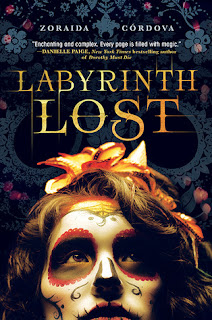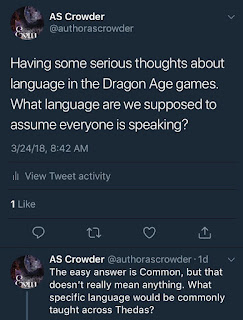Goals Update:
Books read: 45
Words on WIP:12,500
Submissions: 2 rejected, 1 accepted, 1 outstanding
Words on spangly new secret project, part 1: 6,000/8,500
Words on spangly new secret project, part 1: 6,000/8,500
Last time, I
recommended books where we were the monsters and books where characters
navigate the complexity of grief. For this set of recommendations, I want to
dig into types of characters that I love reading
I’m still open to
suggestions for types of recommendations you’d like to see. If there’s a type
of book you want to pick my brain about, drop me a line in the comments to let
me know.
But let’s get to those
book recs.
HEEL-FACE TURN/FACE-HEEL TURN
Admittedly, this one is
a little difficult to give recommendations based on—revealing a heel-face turn
or its reverse is often spoilery. But I’m going to do my best to keep these
recs as spoiler-free as I can. Each book has several characters who struggle
with their loyalty.
This struggle—what side
am I really on? Have I been making things worse or better? Why am I so bad at
being good?—is one of the most interesting types of conflict. This ties in with
my overall greater interest in bad guys who think they’re the good guys. I’d
rather read about a villain who thinks they’re a hero than about someone who
just wants to watch the world burn.
My recommendations
My first recommendation
is LABYRINTH LOST. The heel-face/face-heel turn in this book isn’t necessarily a
huge part of the story, and it’s a little difficult to put the character doing
the turning solidly on one side or the other, but conflicting loyalties is a pretty
major part of the book.
Alex comes from a
family of brujas, and she herself is the possessor of some powerful magic—but she
doesn’t want it. When she tries to get the Deos to take her powers back, things
go off the rails and she has to rely on Nova, a brujo she’s not entirely sure
she can trust to help her navigate the world of the Deos so that she can get
her family back. A companion novel to this book, BRUJA BORN, just came out this
summer, so this is really two recommendations for the price of one.
CHILDREN OF BLOOD ANDBONE has been pitched as what you’d get if Avatar: The Last Airbender was based
on African culture rather than Asian culture—and we all know that A:TLA had one
of the best heel-face turns of all time. Put another way, this book is Black Panther
with magic. This novel uses multiple points of view to show different sides of
the world’s power structure. Magic disappeared one night, and since then,
people that bear the mark of that lost magic have found themselves crushed
under the monarchy’s heel. Zelie has a chance to bring magic back, but the
powerful who wish to keep things the way they are will do whatever they have to
to stop her. This is also a good one if you like heroes with complicated
feelings toward their antagonists. This book is also part of a series, but I
don’t think the release date for the next installment has been announced yet.
QUEER GIRLS FIGURING OUT WHO THEY ARE
Identity is
complicated, and folks who grew up when I did didn’t get much chance to see
their journey’s reflected in books at the time. Thankfully, this is a trend
that’s changing. This category is one that I wish someone had been able to give
me books for when I was a teen. (As an interesting note, both of these books
also take place in the south, which, for me, is another nice layer of
representation.)
My recommendations
In RAMONA BLUE, the titular
Ramona’s life has been unsteady since Hurricane Katrina hit. In spite of the
tumult, she clings to a few certainties—things like her love for her family,
her attraction to girls, and her dreams of something bigger and better than her
life in Eulogy, Mississippi.
Though Ramona’s only a
teenager, circumstances have pushed her to take on the role of an adult in her
household. So, when her childhood friend Freddie moves back to town, he’s a
welcome distraction. And, as their friendship picks up where it left off,
Freddie convinces her to give swimming a try—and she loves it. And thinks she
might love him.
Ramona’s journey is one
that delves into the fluidity of sexuality, resilience of family, and learning
how to adjust to life’s changes.
IVY ABERDEEN’S LETTERTO THE WORLD is actually a middle grade book (meaning that it’s written for
preteens, with POV characters on the younger end of middle school). This is a
book about a first crush. Ivy’s got a notebook full of secret drawings of girls
holding hands. When a tornado rips through her Georgia town and destroys her
house, her notebook full of secret drawings goes missing. She’s in a panic that
gets worse until her secret drawings start showing up, one-by-one, in her
locker. She thinks—or maybe hopes—that the person giving them back to her is
her classmate, a girl named Jane that she thinks she might have a crush on. Ivy’s
got to decide if her secret drawings—and her secret feelings—need to come out
in the open.
Y’all, I’m not a crier,
but this little book got me. I seriously can’t recommend it enough.
I’ll be taking a break
from recommendations next post to do a recap of the Author Event (tickets available through the link above!), but look for
more book recommendations in August.
What are some of the
books you keep recommending to your friends? Drop some in the comments! Let’s
help build up each other’s TBR piles.

















